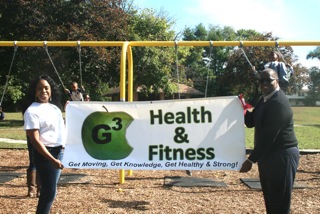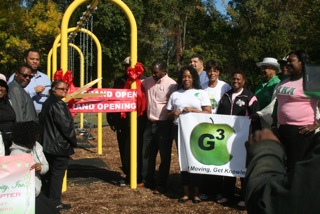Posts Tagged ‘New Jersey’
G3 Health And Fitness Swings!
G3 Health and Fitness was a significant partner in the P.L.A.A.Y. (Promoting Lifelong Activity Among Adults and Youth!) grant to purchase a swing set.
The installation of the new Swing Set for Mill Creek Park, Willingboro, New Jersey was completed in September 2015. According to the Willingboro Recreation and Park Department a “swing set” is an important attraction and important “play time equipment” for all playgrounds.
P.L.A.A.Y. Shaping NJ Grant Partners: Willingboro Recreation and Parks Department, Burlington County Health Department, Pi Mu Omega Chapter of Alpha Kappa Alpha Sorority Incorporated, G3 Health & Fitness, Delilah Winder, Burlington County Community Action Program Head Start and Early Head Start.
G3 Working to Help Solve the Obesity and Hunger Crisis
Many years ago, as a newspaper reporter in New York, I wrote a series about living conditions among migrant laborers on Long Island. These people and their families lived in squalid labor camps in communities that were right next to the Hamptons, where some of the wealthiest people in America spent their summers. Although the workers passed their days picking potatoes, tomatoes and other vegetables, they had little access to a balanced diet and no decent kitchens in which to prepare meals.
I thought until recently that this problem had been solved in our country. Then I became active in G3 Health and Fitness, a New Jersey not-for-profit organization dedicated to reducing obesity in children, especially in Burlington and Gloucester Counties. I learned that one-third of children in America are obese and that the numbers for the counties where G3 does most of its work are hardly better. For example, 37% of non-Hispanic black children in Gloucester County are obese.
Particularly shocking is the fact that, in the middle of this epidemic of obesity, there is a parallel epidemic of hunger. One in four children in our country don’t know where their next meal is coming from. Many of them go to school without breakfast, which has a major effect on their ability to learn. Don’t think that there aren’t plenty of these children in the communities right around us.
If you haven’t seen it already, I recommend that you watch a new documentary film called “A Place at the Table,” which tells the story of several American families and their struggle to give themselves decent food. This movie is available for free at Xfinity on Demand and I strongly urge you to see it.
As I said, obesity and hunger are actually related problems. Buying healthy fresh ingredients is actually more expensive than buying sugar and salt-filled fast food and snacks. Even for middle class families, and especially for working parents who have little time to prepare healthy meals, a diet almost guaranteed to make the family fat is difficult to avoid.
G3 has been working on this problem in many ways, with exercise classes, health and nutrition talks and other programs. Most recently, G3 instituted a 10-week program at the Kennedy Center in Willingboro to teach children and their parents about a healthy lifestyle. Most important, the program is designed to be fun, including dodge ball, kick boxing, Zumba, cooking demonstrations and other activities that all participants will love. The classes are taught by a registered dietician and a personal trainer.
Working together, we can solve the obesity and the hunger crisis, here and throughout America. Let’s get started.
Childhood Then and Now
Childhood Then and Now
I spent my childhood in the 1940s and ‘50s half an hour from Manhattan in a neighborhood that was made famous years later by the TV character Archie Bunker.
It was certainly no one’s idea of country living, yet my life was nothing like that of a suburban child today. After school, we would throw our book bags in the house and head for the streets for games of stickball and punchball, broken up every few minutes to let a car pass by. Or we would go to the nearby woods (later to become an apartment project) for bike rides and wrestling matches. All this would end at dinner time, when our mothers would yell for us to return for a home cooked meal.
There were no computer games. Life on the streets was probably less safe than our parents thought, but no one required us to stay within sight. McDonald’s and the other fast food places didn’t exist yet, so our portions weren’t supersized and calorie laden.
One result of all that was that very few of us were overweight. It’s amazing to realize that 65% of children and teens in New Jersey today are overweight or obese .The health implications of this problem are enormous. Type 2 diabetes, which used to be called adult-onset diabetes, is now a common condition of childhood. Most people of my generation can expect to have longer lives than their parents, thanks largely to better health care. Our children and grandchildren, unfortunately, are likely to have shorter lives because they eat worse and exercise less than us.
We aren’t about to re-create the woods and open spaces of my childhood. But we can encourage our children to get away from the computer games, go outside and maybe learn how to run a bit wild, how to invent new games, how to play with their friends. That, after all, is what being a child is about. And we can prepare nutritious food for them and try to get them to actually like it.
Bob Uris
.

